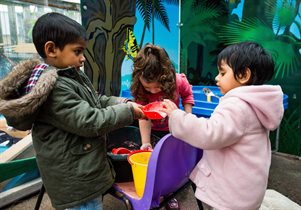Early Years Inclusion
 The Early Education and Childcare Service believes that each child is an individual with their own unique developmental profile. We are committed to inclusion and meeting the individual needs of children. We follow the The Special Educational Needs and Disabilities code of practice to support early intervention for all children with additional needs and SEND.
The Early Education and Childcare Service believes that each child is an individual with their own unique developmental profile. We are committed to inclusion and meeting the individual needs of children. We follow the The Special Educational Needs and Disabilities code of practice to support early intervention for all children with additional needs and SEND.
We believe that parents are the first educators of their child and have a detailed understanding of their child, their development and their needs. They have a unique perspective of their child to share.
For information on services available to children and young people with additional needs and disabilities and their families, please see the Tower Hamlets Local Offer
Other information you can find on this page
-
What is the SEND code of practice?
-
What is the person-centred approach?
- EEC Special Educational Needs Inclusion Fund (SENIF)
What is the SEND code of practice?
The SEND code of practice 2015 describes the principles that should be observed by those working with children and young people who have SEN or disabilities. These include:
-
taking into account the views of children, young people and their families;
-
enabling children, young people and their parents to participate in decision-making;
-
collaborating with partners in education, health and social care;
-
early identification of the needs of children and young people;
-
making high quality provision to meet the needs of children and young people;
-
focusing on inclusive practices and removing barriers to learning;
-
helping children and young people to prepare for adulthood DfE Early Years Guide to the SEND code of practice 2014 (page 5).
Return to top of page
What is the person-centred approach?
In early years, 'the voice of the child' is captured in a variety of ways and central to this process is the parents' knowledge about their child. Person-centred planning gives confidence to parents that they are being listened to and their views and contributions are valued.
Person-centred planning is an approach where children are treated with respect, honesty and care as their views, feelings and wishes are listened to and used to inform the support they receive. Parents are central to this process.
Person-centred planning is underpinned by the four guiding principles in the Statutory Framework for the Early Years Foundation Stage. It also reflects the underlying principle of SEND code of practice 2015.
Person-centred planning supports everyone in getting to know the child better in order to plan effective support and the strategies are more meaningful as they are understood and agreed by everyone.
Person-centred planning meetings are supportive environments where everyone, including the child if appropriate, has opportunity to share their views and plan for the child. If it is not appropriate for a child to attend the person-centred meeting, it is essential to plan how the child's views and feelings will be represented which may include:
-
everyone sharing their perceptions of the child and what they think are the child's views and feelings;
-
discussion about the perceived views and feelings to make sure everyone understands;
-
observations which have been made at the setting and home;
-
All About Me book;
-
photographs;
-
video.
Further information on person-centred planning can be found in the guidance Person-centred planning with children and young people – the Tower Hamlets model.
EEC Special Educational Needs Inclusion Fund (SENIF)
All Early Education and Childcare (EEC) providers need arrangements in place to identify and support disabled children and children with special educational needs (SEN). They must also promote equality of opportunity for children in their care.
Most children with extra needs are supported and make progress through provision available in Early Education and Childcare settings. A smaller number of children may have emerging needs requiring extra support.
They could be eligible for more funding to support them to access an early education or childcare provider.
The extra funding available, where eligible, is paid to the EEC provider:
- EEC Special Educational Needs Inclusion Fund (SENIF) for 2, 3 and 4 year olds
- Disability Access Fund (DAF) for 3 and 4 year olds
Children can receive both SENIF and DAF. Where a child has an Education, Health and Care Plan (EHCP), they are not eligible for SENIF.
For more information please visit the Early learning and childcare funding page.
Return to top of page